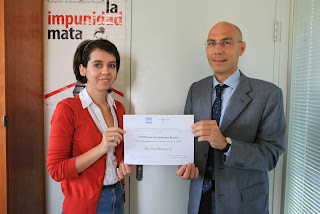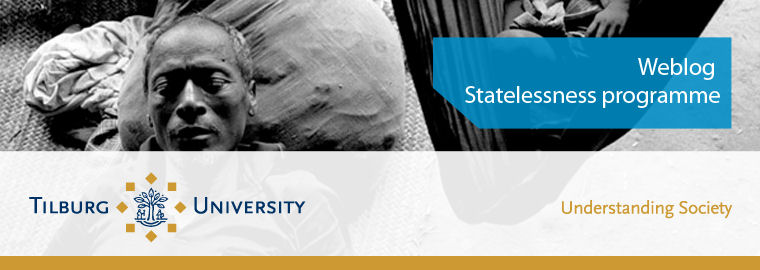Today, the
Office of the UN High Commissioner for Refugees (UNHCR) and Tilburg University
on Friday named the inaugural winners of the UNHCR Award for Statelessness
Research. The announcement coincides with the anniversary of the 1954
Convention relating to the Status of Stateless Persons (tomorrow, 28
September).
The winners…
In the
undergraduate category, the winner is Amanda
Cheong, whose thesis "Changing Conceptions of Citizenship Among
Stateless Chinese-Bruneian Immigrants in Vancouver," was nominated by the
Department of Sociology at the University of British Columbia in Canada. Cheong
selected one of the world’s least-known situations of statelessness as the
subject of her research: the Chinese minority of the Sultanate of Brunei
Darussalam. Cheong explores the implications of statelessness for peoples’ life
chances in Brunei, looks at how international migration has been adopted as one
response to this situation and how the exposure of those who have settled in
Canada to a new and very different citizenship model has changed their
understanding of the relationship between the individual and the state. She
bases her analysis on oral history interviews with 13 Chinese-Bruneians who migrated
to the Greater Vancouver area between 1974 and 2011. The Jury was impressed by
this original data collection and the manner in which both the methodology and
the findings are presented, concluding that this well-refined and informative
sociological study provides a useful contribution to deepening the understanding
of statelessness. The Jury further made an honourary mention of Ms. Sára Heinik’s
undergraduate level work entitled The
Elimination and Reduction of Statelessness in International Law-making and its
Effectiveness. This thesis, submitted to Corvinus University of Budapest
(Hungary) as part of an undergraduate programme on International Relations, provides
a comprehensive and well-written overview of international law governing the
problem of statelessness.
In the graduate
category, the jury named two winners. The first is Eva Mrekajová, whose Master of Laws thesis on the
"Naturalization of Stateless Persons" was nominated by the Department
of International and European Law at Tilburg University. Mrekajová undertakes
a highly methodical comparative study of the legal practice surrounding the
naturalisation of stateless people in three European states. The second winner is Caroline
McInerney, whose independent study paper entitled "Citizenship Laws of
Madagascar: Future Challenges for a Developing Nation" was nominated by
the University of Virginia School of Law in the United States. McInerney presents an extensive review of the content
of the Malagasy nationality regulations and identifies how the law is serving
to create and perpetuate cases of statelessness in the country. Both
of these students identified highly original research questions and, in working
to answer them, they demonstrated a thorough understanding of the issues at
stake and a strong analytical ability, such that their work offers a tangible
contribution to furthering the study of statelessness.
 |
| Eva receiving her Award certificate from UNHCR's Director of International Protection, Volker Turk |
No prize in the
doctoral category was awarded this year, but the Jury was greatly impressed and encouraged by the
diversity, ingenuity and quality of the undergraduate and graduate-level
nominations received and, in its report, expressed confidence that “a new
generation of talented young scholars will choose to pursue further studies in
this field and looks forward to reviewing the fruits of this labour in years to
come”. The Jury also made an honorary mention of Lindsey Kingston’s doctoral
thesis entitled Legal Invisibility:
Statelessness and Issue (Non) Emergence, which earned Kingston her PhD in
social science from the Maxwell School of Citizenship and Public Affairs at
Syracuse University (United States) in 2010. In it, Kingston sets out to
uncover and explain why some issues make it onto the international agenda and
others do not, using statelessness as a case study. The Jury considered the
thesis to be worthy of a special mention because it has clearly demonstrated
the value of statelessness as a case study within research that explores
related themes (in this case, issue-emergence) and hopes that it will serve as
a source of inspiration to other young researchers in this respect. The Jury
also pointed out that the fundamental question it identifies and dares to pose
with regards to the ‘non-emergence’ of statelessness is an extremely pertinent
and timely one, using its report to encourage all those concerned with pushing
statelessness up the international agenda to give due consideration to the concrete,
practical and valuable recommendations that Kingston draws from her research.
Background to the award…
In early 2013, UNHCR
and Tilburg University’s Statelessness Programme invited academic institutions
to nominate excellent research at the undergraduate, graduate and doctoral
levels in the field of statelessness for the newly established UNHCR Award for
Statelessness Research. In this, its inaugural year, a total of 15 nominations were
received, spread across the three award categories. The nominations were
submitted by academic staff from 13 different universities, across eight
countries. The research represented a variety of disciplines, including
international law, political theory, sociology, international relations, social
science and cultural psychology.
Following a
detailed review by a committee within Tilburg Law School, a shortlist of
eligible, top-quality research pieces was drawn up and forwarded to the
International Expert Jury for their assessment. In accordance with the Award
guidelines, the papers and dissertations were judged on the basis of four main
criteria: 1) Contribution to increasing understanding of the nature and scope
of the problem of statelessness, identifying stateless populations and
understanding the reasons which have led to statelessness; 2) Timeliness and importance
of selected topic; 3) Quality of research; and 4) Quality of writing.
In 2013, the
Jury members who assessed the undergraduate and graduate level nominations
were: Prof. Kohki Abe (Kanagawa University,
Japan), Prof. Khadija Elmadmad (Rabat University, Morocco), Dr. Benyam Mezmur (University
of the Western Cape, South Africa), Prof. Peter Spiro (Temple University,
United States) and Prof. Carmen Tiburcio (Rio de Janeiro State University,
Brazil). The Jury members who assessed the doctoral level research were: Prof.
René de Groot (Maastricht University, the Netherlands), Dr. Sriprapha
Petcharamesree (Mahidol University, Thailand) and Prof. Kim Rubenstein (Australian
National University, Australia). The
Jury was co-chaired by Mr Mark Manly (Senior Legal Coordinator Statelessness,
UNHCR) and Dr Laura van Waas (Tilburg University’s Statelessness Programme) who
reviewed all of the nominated work and jointly compiled the Jury report
presented below, based on the assessments made by all of the aforementioned
Jury members.
In early 2014,
UNHCR and Tilburg University will put out a new joint call for nominations of
students’ work which offers a clear contribution to
increasing understanding of the nature and scope of the problem of
statelessness, identifying stateless populations and understanding the reasons
which have led to statelessness, in particular in regions or within disciplines
where little research has been done. The 2014 UNHCR Award for Statelessness
Research Nomination Guidelines will be made available via the website of the
Statelessness Programme and of UNHCR.

No comments:
Post a Comment